My eldest brother has never set foot on a sailing school. But a boating license hasn’t stopped him from sailing away on big ship cruises. He loves the fact that you can pay for a cruise-long open bar, obviously. Plus, he loves the room service, lazing by the pool, and getting dressed up for fancy cruise dinners.
I have yet to voyage on a large cruise. But I don’t think I can stomach being stuck in a small cabin when I want a brief respite from thousands of people onboard with me. The fact of the matter is that my brother and I share two very different ideas of what holidays should be.
My most beautiful and talented wife loves beach holidays. She loves that she can often move freely from the pool to the beach and then to the bar. She loves that someone will make up our room, and that wherever we are, we have a base to explore the local culture and cuisine.
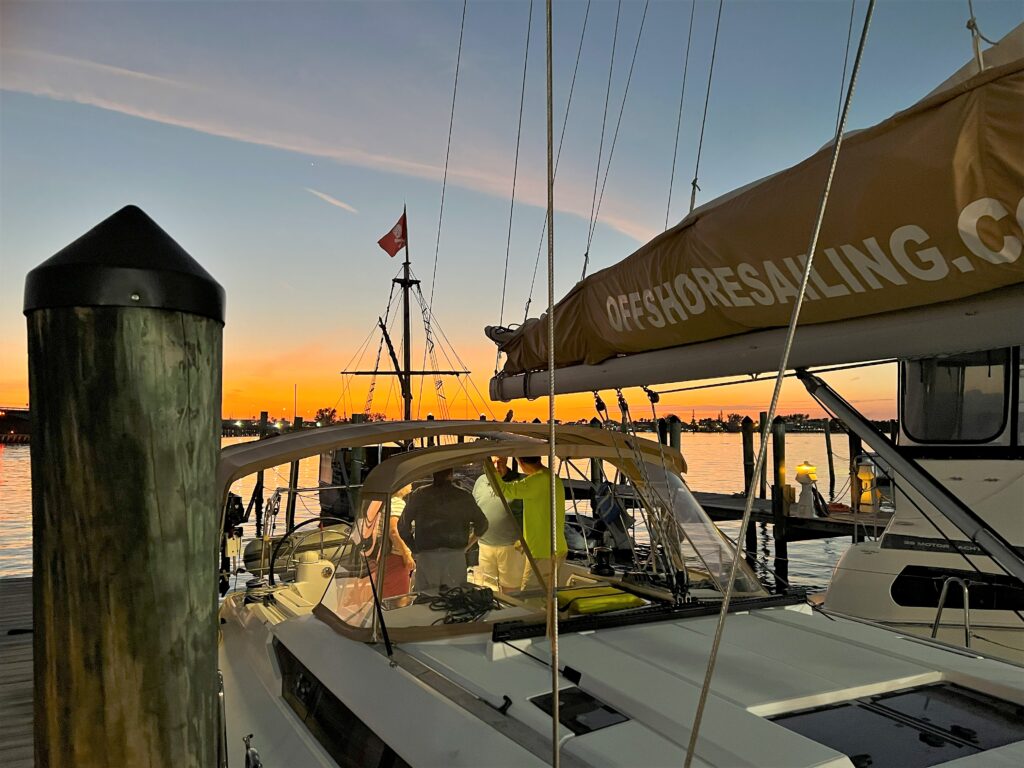
Why take a learn-to-sail trip?
I too love these ideas. But I know that I can never sit still during a beach vacation. If I’m not doing something, I quickly get antsy. In our marriage, the hot debate of just how much doing one should do when trying to do nothing has raged for decades!
Enter a vacation where you can have the best of many worlds combined; an amazing compromise on the water. Enter a learn-to-sail vacation, enjoy a wonderful time, and come home with lifetime memories and a boating license.
I had been informally sailing for a long time. My father had been a member of a sailing club in Boston. Over those formative years, I had accrued a very modest amount of sailing knowledge. When the pandemic hit, I decided it was time to get a small amount of formal education on the topic, so that I could spend a bit more time with my father and family. I found a sailing school and did a course that went two nights a week (one classroom night and one on-the-water sailing night) for about six weeks with the same local sailing club and earned my basic keelboat sail certificate in Boston. That’s when I became hooked with sailing.
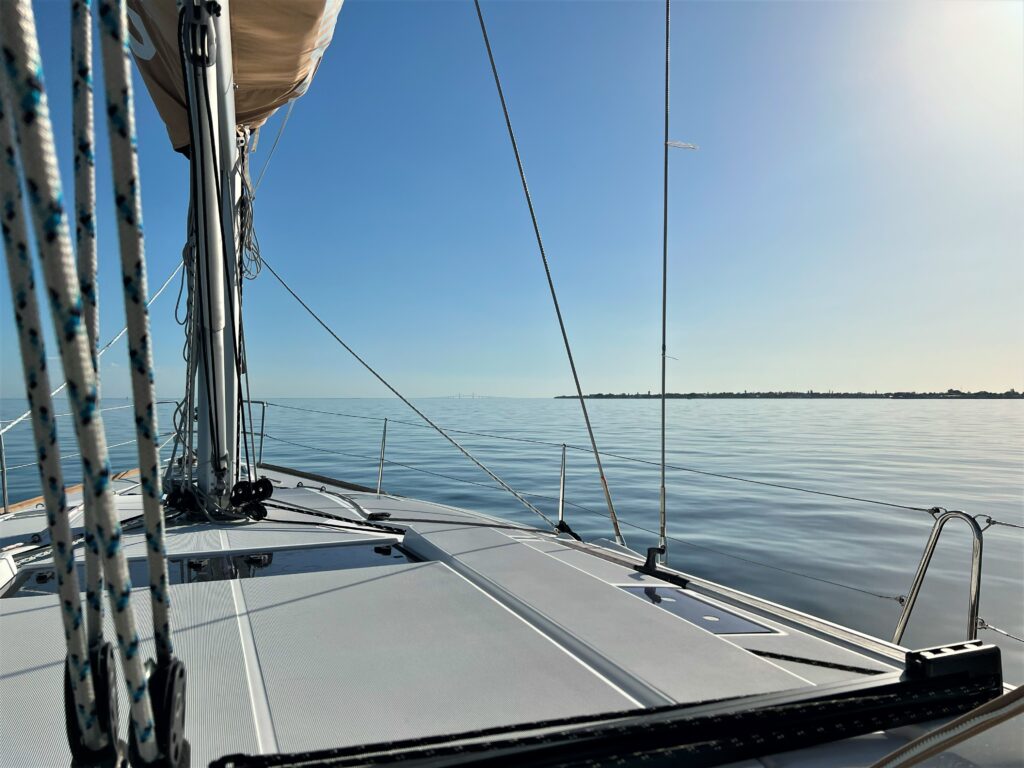
Getting a boating license with Offshore Sailing School
The idea of getting a boat through the water without an engine—tuning my skills as I tuned the sails—became infectious in me. Now that I had a boating license, exploring the harbor islands and passages between them became wondrous. Reading the wind and the water became an intriguing challenge. Feeling the boat heel and speed pick up became meditative.
After a couple of seasons of local sailing in Boston, I wanted more. More sailing, bigger boat size, but also more knowledge. I had been lucky enough to charter a boat in the British Virgin Islands as a teenager, but that was with my experienced father at the helm. I had my own family now and I dreamt of a time when I could take them on a cruise to the Baths, or to Jost Van Dyke.
On one of these internet dreams—looking at layouts of boats that I certainly couldn’t afford to purchase—I researched for more sailing school opportunities. Steve & Doris Colgate’s Offshore Sailing School seemed to be a reliable, quality option. The sailing school offers courses for anyone who wants to learn to sail, whether you have a basic certification, boating license, or no certification at all.
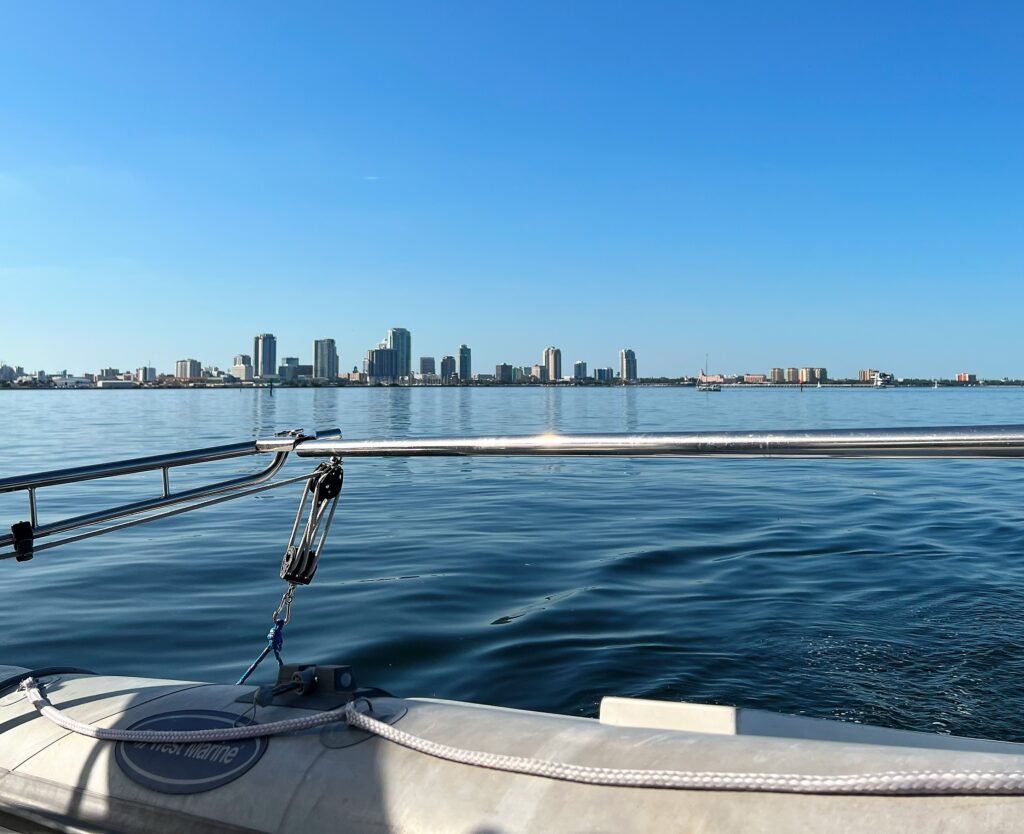
One such course was a six-day sail from St. Petersburg, Florida in February that promised to take my sailing education to the next level, all while enjoying five nights aboard a beautiful 48-foot sailboat. Well, what better time to escape a Northeast winter than February? And there’s no better place to relax and learn than aboard an amazing sailboat. I signed myself right up. Those dreams of chartering a sail with my budding family were getting louder and louder in my mind.
The boating license adventure begins in Florida
I arrived on a Sunday morning, fleeing record setting subzero temperatures in Boston to a moody but warm St. Petersburg. My first night was in a hotel, and the next morning I’d meet my instructor and new shipmates at the dock bright and early.
I was fairly anxious about spending time with four strangers (three other students and one instructor) on a boat for five full days. I’ll be honest, I’m in my late 30’s and meeting new people isn’t always high on my priority list these days. However, there were two points that put me at ease. First, I had read that the well-appointed boat had four berths or bedrooms and four bathrooms! I’d have my own toilet and shower! Second, upon introduction to our instructor Kelly, he quickly made us realize that we were all there because we had something in common: we all wanted to learn more about sailing.
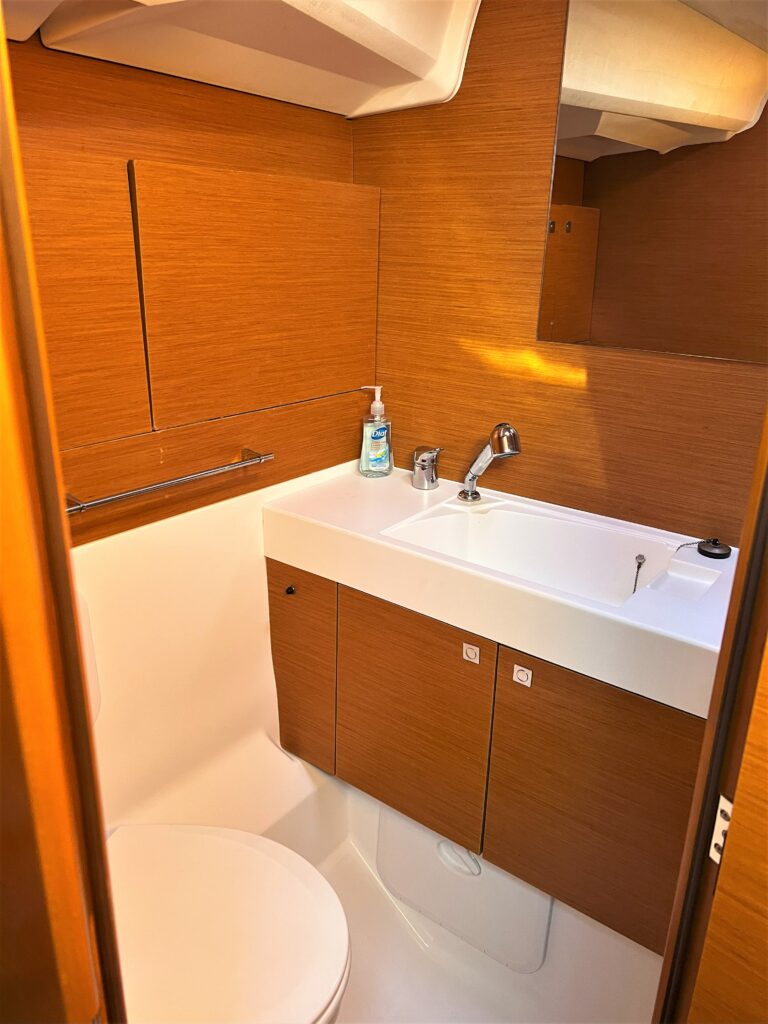
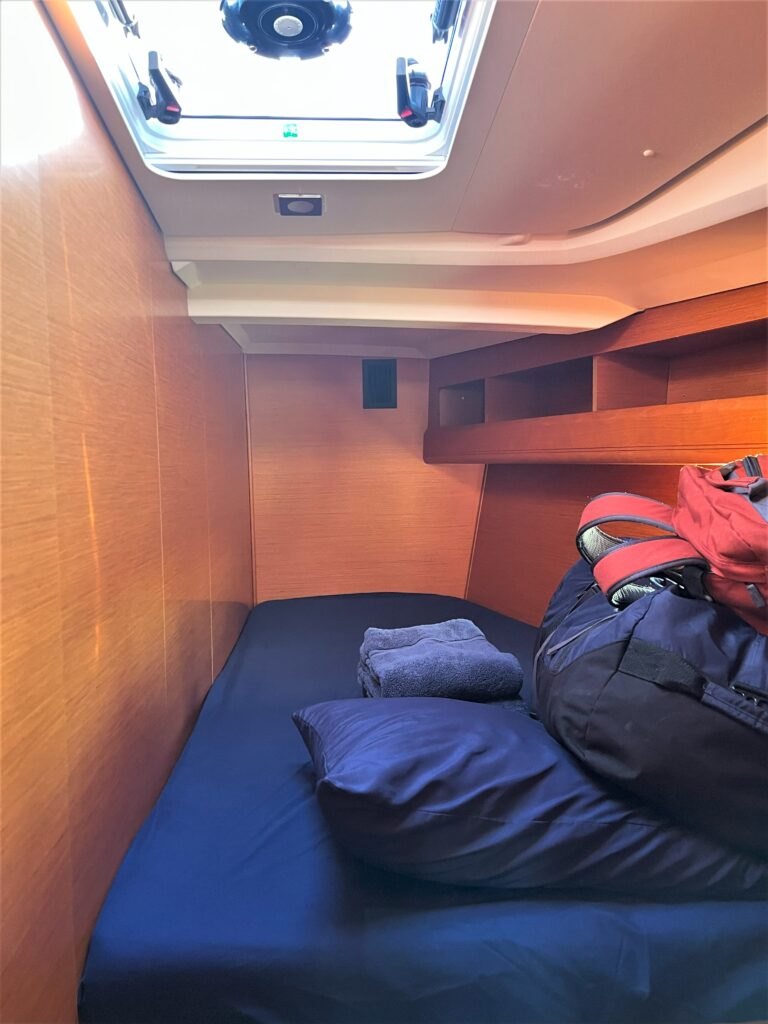
So there we were, bright and early on Monday, aboard our sailing school and exploring the yacht. There was a couple that had come together, Becca and Kent. There was an ex-Navy engineer named Joe. And there was Kelly, a transplant to Florida decades ago that now teaches and sails professionally. He also races for fun.
Becca and Kent, whilst having some sailing experience prior to the trip, had taken a basic keelboat course over the weekend beforehand with Offshore Sailing School. Joe had been a long time sailor and owned a dinghy himself. And there was me, whose own formal education was limited to online-led classroom sessions during the pandemic, but a growing amount of hours in the practical sailing world.
Our sailing school set out to cover a wide variety of topics. It also included:
- Three classroom modules with brief exams that would give formal boating license certificates in basic bareboat, basic charter, and large boat fundamentals
- Safety systems of the boat
- Overview of mechanical systems onboard, including checking of engine oil, engine belts, bilge pumps, water systems, etc.
- Overview of electrical systems onboard, including electrical generators, running off shore power, and use of the radio
- Basic navigation and course plotting during coastal cruising
- And most importantly—also most fun—learning to sail a 48-footer and all the maneuvers that such an act encompasses!
Monday: Prepping the ship and stowing the gear
After stowing our gear, it was time for provisioning. The four students packed away a pre-ordered grocery order. This included breakfast, lunch, and snacks for the whole week, as well as four cook-aboard dinners. We also obtained some beer and seltzers—and that’s when I knew Kent, Becca, and I had been brought together by our sailing school for a reason. We would get along famously while working on our boating license, as they had brought a rather large bottle of high-end rum. Cruising and rum go together like peas and carrots.
After packing away our provisions, it was time to get the water holds pumped. Whilst this can be a bit smelly, it is most necessary to understand how these systems function. A small boat pulled up and Joe—eager as ever to learn—put the vacuum hose into each of the four holding tanks on our boat. The whole act took less than ten minutes. With this minor chore behind us, we switched to fresh water for the sinks and showers. Using the slip’s hose, we filled four different holds.
Up next: The safety talk
Kelly sat us down with a whiteboard and talked us through the different safety mechanisms on the boat. We covered lots: from lifejackets to emergency radio calls, as well as fire extinguishers, life rings, and life rafts.
From there, we learned to check oil levels in the engine compartment and made sure that engine belts were properly tensioned.
After that, it was time to understand the procedure to move out of the slip. This was going to be a bit tricky as the wind was pushing on the starboard freeboard and holding the boat into the dock. We talked all through which lines to release first to ensure that our bow pointed at a safe angle to depart. It was then on to starting the engine at the helm and off we went!
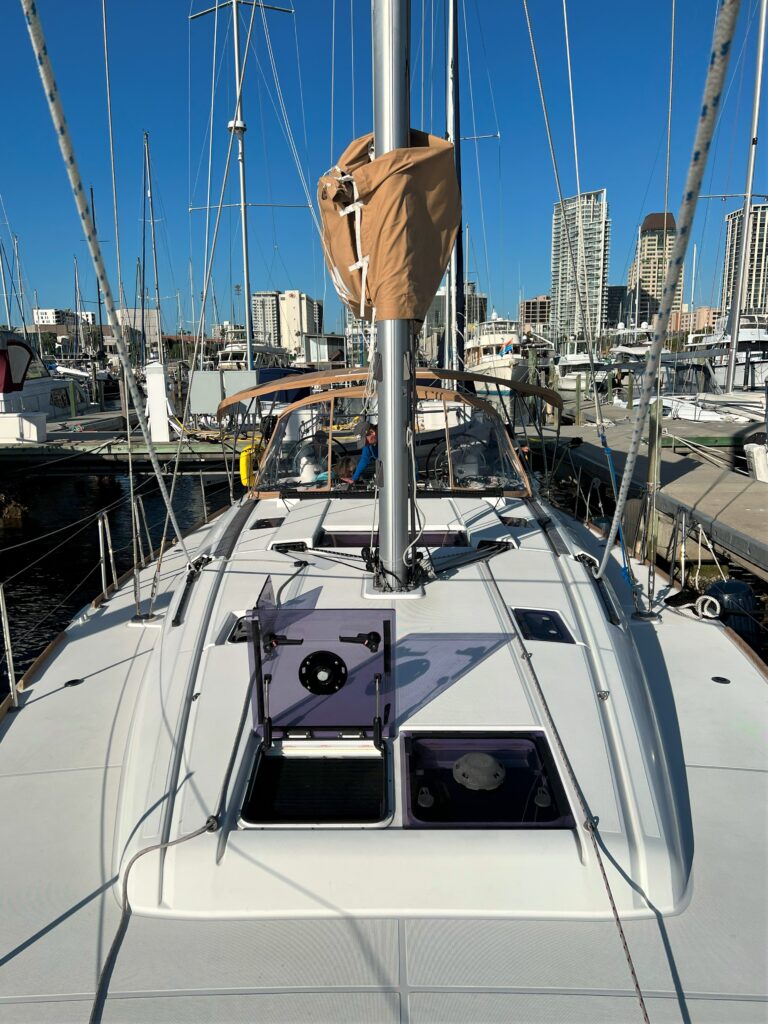
Our first task was to navigate out of the marina and into the inner part of Tampa Bay. Under the motor, we all took turns cruising through a tight channel southward, around Point de Soto and into an anchorage by the base of the Skyline bridge across Tampa Bay. We each took turns getting the feel of the boat under power while others checked depth and watched our progress on a navigational chart.
Anchorage arrival
We arrived at our anchorage around 5 p.m. With the wind coming at us from the land, we nosed the boat ever closer to the shore. We moved deliberately as Kelly talked us through the procedure for anchoring. Two of us were to go to the bow. The first person would use a remote to control the electronic winch holding the anchor line while the other was to relay signals back to the skipper.
Once we reached a point close enough to land and in 8-9 feet of depth, we lowered the anchor down and let out the chain (at the correct scope). With Kelly showing us how to read the boat and anchor tension, we let the wind push the boat backward, as the anchor dug into the sea bottom below. We repeated this a few times. The chain is let out a little more each time. Then we put the engine into reverse to make sure that the anchor was fully holding the boat. It was incredible to feel the boat tighten against the anchor line and then whip back toward the wind.
After a full day of getting to know the boat, we had “made camp” for the night. It was time to breakout the barbecue and beers! That night, we cooked halibut (oh did I mention that Kent and Becca were fabulous at preparing and grilling food and cocktails? Why was I ever even nervous about meeting new people?!) on a propane grill, and ate up the sunset. The night-time breeze felt gorgeous and I slept with the hatch on my cabin open—reveling in the sound of the sea. I slept amazingly in the soft sway of the boat in my starboard fore berth.
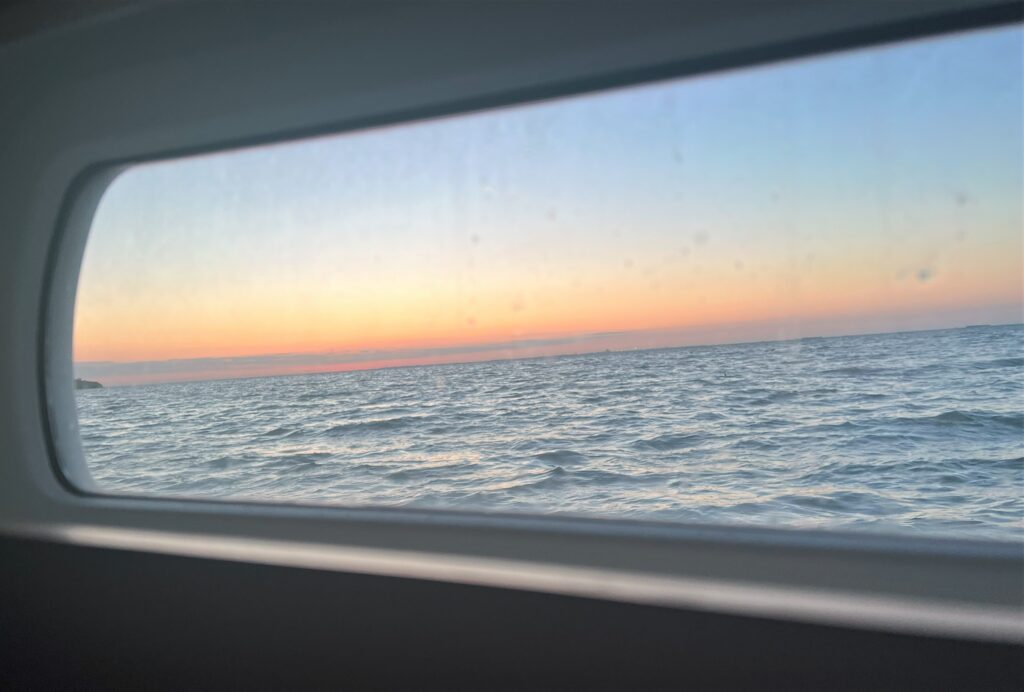
Tuesday: Light sailing and the Manatee River
Come Tuesday morning, it was time for eggs and coffee. Being a bit paranoid that I might run out of coffee, I had packed powdered cold brew. But the boat had French press and the provisioner had gracefully brought us a pound of amazing coffee. We all agreed the stronger the better. And sitting around the boat’s comfortable table, sort of like a large restaurant booth, we talked about the plans for the day.
We soon raised anchor and motored back into the main channel before raising sails. The wind was very light, which made progress slow. But it gave us time to go over more navigational instruction in the fairly busy channel.
Then, we passed under the Sunshine Skyway Bridge that connects St. Petersburg to the other side of the bay and Bradenton. This was the outer bay—not quite in the Gulf yet, but a bit more room to test our sailing skills on the big Jeanneau.
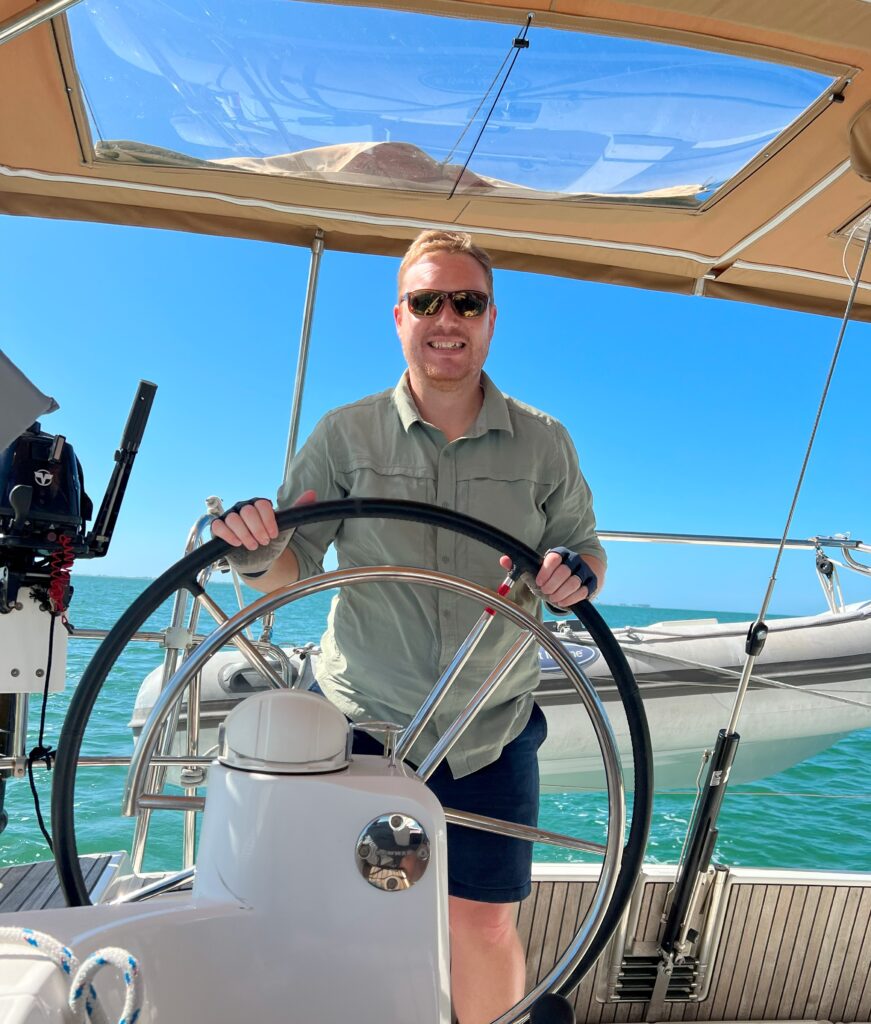
Learning man-overboard drills
We practiced heaving to, which is a maneuver designed to stop the boat while out at sea and either give time to react to a situation or give the crew a rest. This maneuver allows the boat’s jib sail to oppose the rudder (which is put into the opposite direction). It puts the boat into a calm state of equilibrium. At this point, we also started to practice man-overboard drills: tossing some lifejackets tied to empty water containers over the side of the boat! We learned to do figure-eights and come back up to our “dummy” crew member into the wind and pick them up! We were all having fun while working on our boating license!
As the afternoon wore on, we turned south and headed into the Manatee River. Here, we selected an anchorage near Hooker Point and went through our process to drop anchor and make sure the boat was secure for the evening. It was at this point that we learned to lower the little dinghy hanging off the back of the boat down into the water. This was a learning process! I must say though, after having some tough fights in my life starting lawn mowers and other power tools, the dinghy’s little Tohatsu outboard sputtered into life immediately. We all took turns taking the dinghy out for a spin around the boat and up and down the river a bit!
After securing the dinghy to the boat once more, beer and cocktails came out—and we cooked another brilliant dinner. I fell asleep with the slight sound of the water trickling past my cabin and the stars shining bright overhead once again.
Wednesday: Tackling the sailing school naval classroom
Wednesday morning came bright and sunny. We had scrambled eggs with cheese, toasted English muffins, and of course fresh fruit and coffee. What a way to start the day!
Today was all about classroom-style instruction. In order to get our boating license in this course, we were covering three different modules. But today was spent covering everything from rules of the road, navigation, and emergency procedures. Kelly was great at really diving into the very important information. He didn’t spend too much time on lesser details that we could pick up whilst underway. We then took one of the exams needed—and everyone passed with flying colors. That would be a continuing theme on this trip!
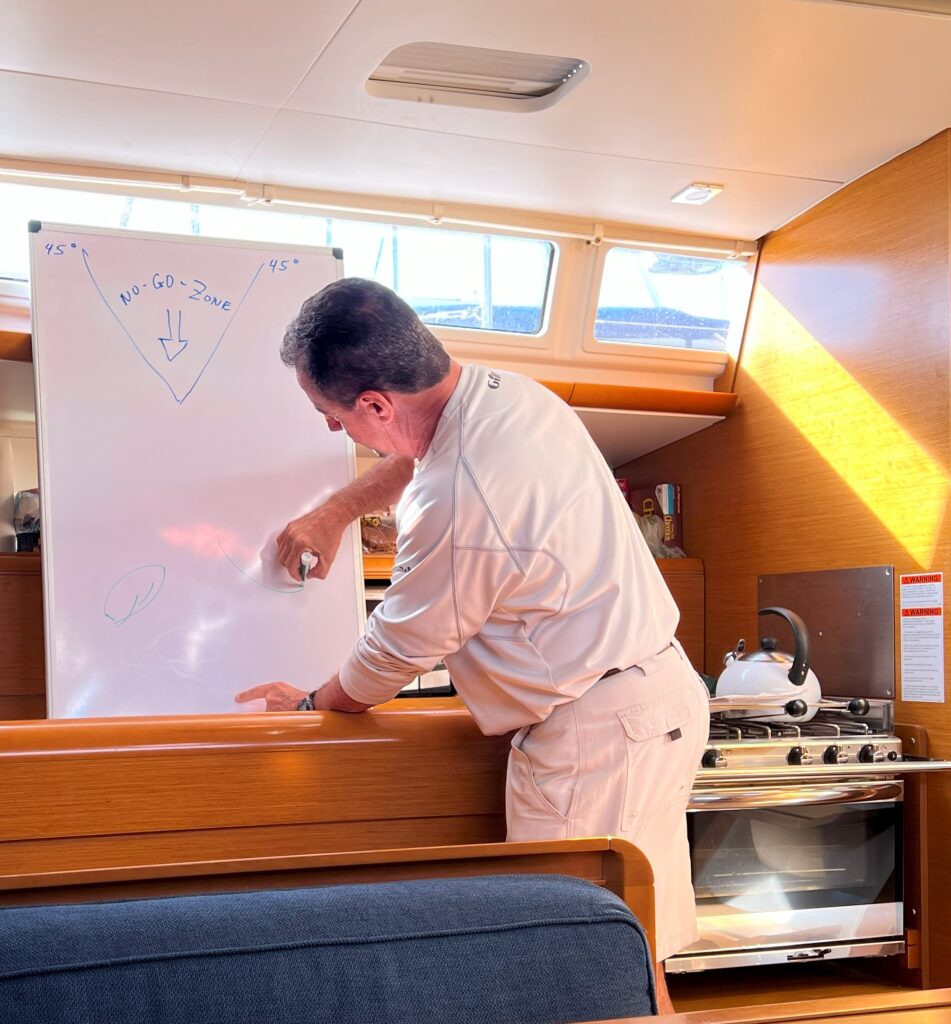
Cruising out of the Manatee River, we hung a tight left turn down into the Intercoastal Waterway heading toward Bradenton. Our goal was to get the timing right for the opening of the Anna Maria drawbridge. It only opens every hour or so. This involved our crewmates talking to the bridge operator over the walkie talkie, as well as signaling intentions to other boats who might be coming through the bridge in the opposite direction. We also had to keep the boat as stationary as possible in a fairly tight channel whilst waiting for the bridge to completely open!
Putting our boating license on pause to refill and recharge
The mast aboard our boat was 65-foot high—and most bridges on the ICW only allow masts of about 55-feet. So we knew that after the Anna Maria bridge, we couldn’t go any further down the ICW.
We pulled into a marina with a very Floridian restaurant called the Seafood Shack just off the docks. Once again, Kelly was brilliant at getting the boat into a tight slip. We went through docking procedures, including tying various spring lines and making sure they wouldn’t move. We also connected electric power and turned on the air conditioning! After a long slow sail in this passage, it was amazing to have cool air pumped right into the boat.
The marina had showers and bathrooms we could use, so that we didn’t have to use the boat’s showers for a night. We then settled into dinner inside the restaurant, each getting drinks and food of choice. I had some brilliant baby back ribs that really hit the spot.
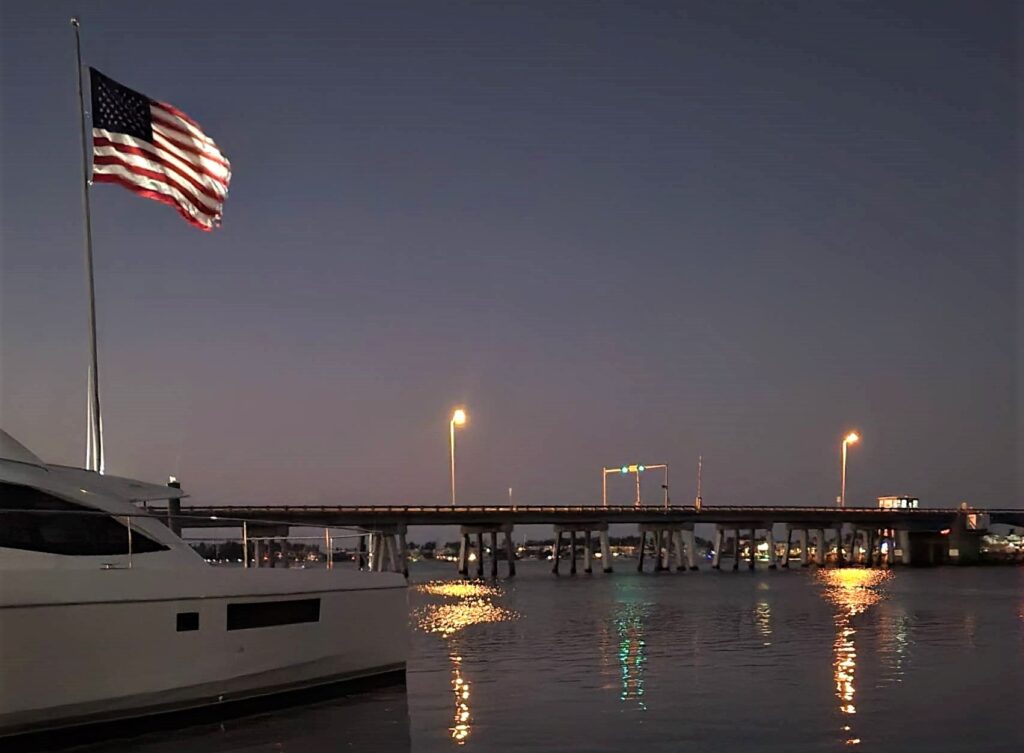
Thursday: Mastering mooring
We reversed Wednesday afternoon’s path untying docking lines and slowly backing out of our slip. We went through the process of communicating with the drawbridge operators and got back out into Tampa Bay. With little wind, we spent a lot of time motoring, but made it back to St. Pete’s fairly early in the afternoon.
This is where the intense practice of mooring the boat in slips was done. Using the yacht basin just north of St. Pete’s pier (which is really cool architecturally as well!), we all had turns practicing pulling the boat alongside a dock. Then, we tried backing into smaller and smaller spaces, and turning the boat in tight quarters. This involved standing beside the ship’s wheel rather than behind it, so one could keep their eyes forward and backward at the same time. I was so anxious not to hit one of the many expensive boats (or even our own expensive boat!), but we all prevailed thanks to Offshore Sailing School and the sailing skills we were learning to get our boating license.
By this point, the wind had picked up and we headed back to our own slip for a night out in St. Petersburg. This was one of the funnest times on the sailing school trip for me. We hung out in the slip (having a drink or two), then went and had showers ashore. After that, we strolled downtown to a nice little restaurant and ate outside on the patio! What more could I want as I remembered how cold Boston was when I left.
Friday: Big wind and taking charge
Friday morning came at the Offshore Sailing School and the sunrise pushed off some early morning clouds and fog, revealing a brilliant day. We did more instruction and another exam over breakfast and coffee. But today, we had something else that had been missing from many parts of the week: wind!
After some instruction about anchoring and mooring during windy periods, we headed right out into Tampa Bay and just spent the whole day sailing. Kelly let us do everything by ourselves. He went and had a coffee and let us really own our experience and knowledge. It was absolutely brilliant! We had the boat going over 8 knots at points, almost dipping a rail into the water. Everyone took turns manning the sails, skippering at the helm, or winching during jibes and tacks. The sun shone brightly on us, but the wind kept us cool as we darted back and forth across Tampa Bay multiple times. We watched schools of Opti sailing dinghies, and even saw dolphins! It was just a blast.
Friday evening came and we cooked steaks back in the slip at St. Pete’s Municipal Marina. After dinner, my crewmate Joe and I headed over to Doc Ford’s Rum Bar & Grille on the pier to gather our thoughts. I think we came to some amazing realizations.
Overall thoughts on getting a boating license from the Offshore Sailing School
This was an incredible trip. It brought a unique blend of learning and fun in the sun. Things were both challenging but relaxing—and I met some amazing people. My crewmates Becca, Kent, and Joe were delightful. Not only were they great people to spend time with—and with some amazing skills, especially Kent’s cooking!—they were absolutely encouraging and inspiring when it came to pushing our sailing knowledge and skills along. I can’t thank them enough for making the week wonderful.
Then there was Kelly. His knowledge, patience, and ability to distill down fairly complicated topics in small doses was impressive. He was always calm and cool, and always let us learn. He hit on all the classroom materials, all of us passing each of the exams, but he pushed us to do more practical and pragmatic learning with the boat while underway. His confidence in us as a group made a massive difference as we felt we could do anything on that boat!
So, who is this hands-on-bareboat certification week really for? Honestly, anyone. Anyone looking for a bit of adventure, a bit of learning, a bit of sunshine. But really anyone with the curiosity to explore. I know that I will continue to use my sailing knowledge as I get older. And I’m already working on plans to take my family to the Caribbean for a week-long sailing excursion. The professionals at Offshore Sailing School have given me the confidence that I could take my family sailing, safely, while being able to relax on a holiday. Getting a boating license is a win-win-win for everyone.
A million thanks to the Offshore Sailing School for hosting us on this incredible experience. As always, all opinions on travel are unbiased and ours alone.
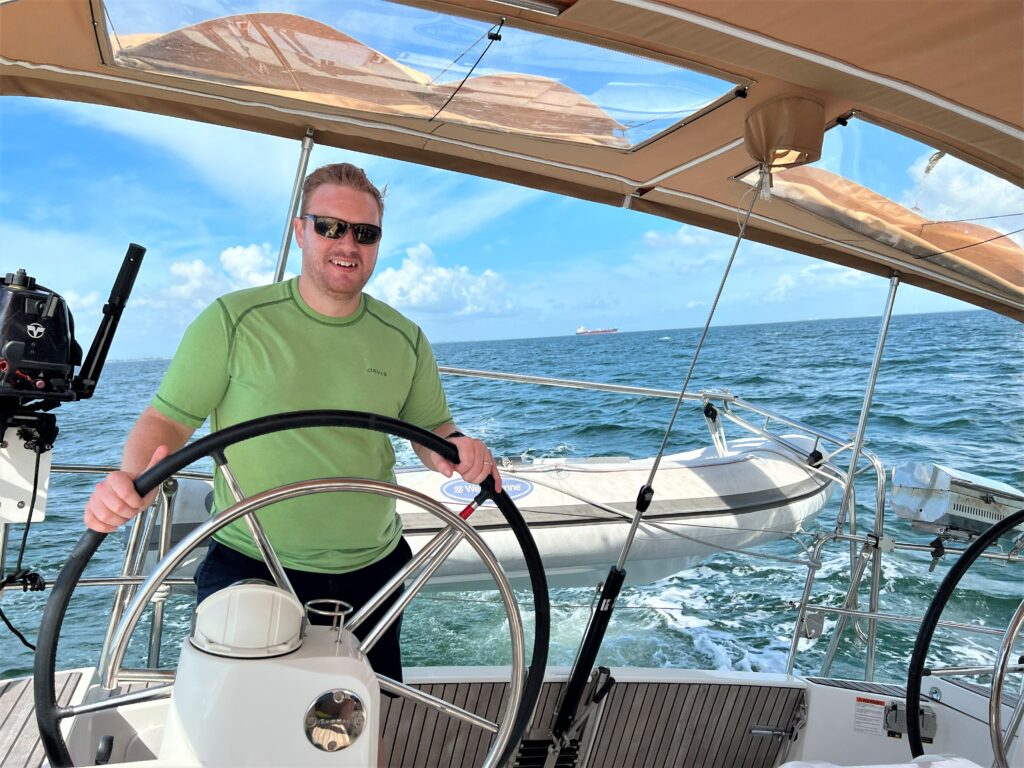

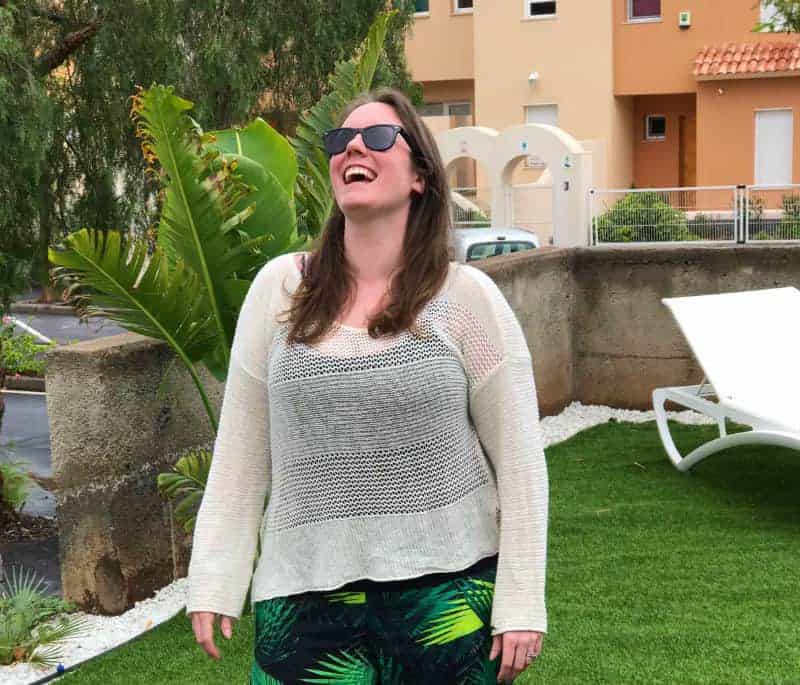


Woohoo! Can’t wait for future sailing adventures!
Fantastic!! I could not agree with you more, Christian! It was a week to remember, that is for sure.
Hello Are you interested in buy guest post